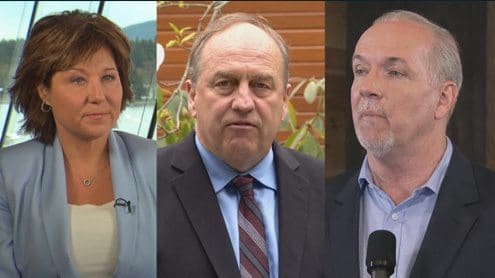 It’s time to give advice to the newly-elected B.C. government, even if we’re not sure who that will turn out to be.
It’s time to give advice to the newly-elected B.C. government, even if we’re not sure who that will turn out to be.
Right now, British Columbia doesn’t have a clear winner as a result of the May 9 election. Nor are we likely to have one for weeks – or even months. Even then, the government is likely to be a minority.
Decisions will be few, time consuming and difficult with no one party able to call the shots. Adjustments and compromises may often defeat the effectiveness of bills. The newly-elected representatives will devote much of their time and energy to politicking in the legislature rather than serving the people, to whom they all promised that they would deliver good things.
We should be able to put the nasty election campaign behind us. But can we?
Minority governments often get defeated early, leading to another election. No one seems sure how the B.C. law on fixed election dates would affect this. Do we go back to the polls once a government motion is defeated in the legislature or do we have to muddle through for four years regardless?
Andrew Weaver, the leader of the Green Party, will likely become the kingmaker. He has said that he will demand a change in the electoral system to some form of proportional representation. Proportional representation almost always leads to minority governments, so we might have to get used to this.
A government will be formed even if we don’t know exactly when or how long it will last.
Since we don’t know who will be in that government, here’s some advice to all B.C.’s elected officials, whether they end up governing or in opposition:
You’ve all said or implied that you hoped to be elected in order to make B.C. a better place and to improve the lives of British Columbians. No one would have elected you if you had said you wanted to get and keep power no matter what it took. Remember this when you’re in a position to make a decision.
Unfortunately, in the past, faced with a noisy problem, elected leaders take quick action that appears to solve the problem and gets it out of the headlines. Often, these short-term solutions lead to long-term problems.
One federal example was when a few bad employers exploited and underpaid foreign workers. The short-term reaction was to decree that no cheap foreign labour would take jobs from Canadians. That meant access to foreign workers was made more difficult for all employers. But Canadians were unwilling or unable to fill the jobs that foreign workers had held, and businesses and the overall economy suffered.
A more considered examination would have shown that foreign workers contribute to the economy and that the problem was with a few bad employers. Having inspectors check on workplaces using foreign workers (none were in place at the time) would have been a much better solution.
So, as B.C.’s members of the legislature struggle to make a government work, they should take a long, serious look at the issues they’ll act on. Let the big picture and the long-term impact inform any decision. Short sound bites can work well in getting elected. Once in power, the short, the simple and the simplistic can be disastrous. Complications abound and situations are hard to explain on bumper stickers – the only thing, one wag said, that the electorate reads.
Here’s a wild idea: Perhaps some research or cost/benefit analysis should be done so long-term impacts can be known before taxes and other policies are changed, or limited funds are spent.
It’s government’s job to deal with all the complexities and consequences of its actions. The civil service has or should have the resources needed to do this. It’s difficult enough to do the job in a majority government. In a minority government, the temptation is strong to opt for short-term and politically-expedient solutions, even when it’s bad policy, rather than the longer-term solutions that are more difficult to explain.
Let’s wish all of B.C.’s newly-elected MLAs the calmness and patience to deal with the uncertainties, and the courage, knowledge and strength to do what’s right for the province.
Troy Media columnist Roslyn Kunin is a consulting economist and speaker.
The views, opinions and positions expressed by columnists and contributors are the author’s alone. They do not inherently or expressly reflect the views, opinions and/or positions of our publication.

